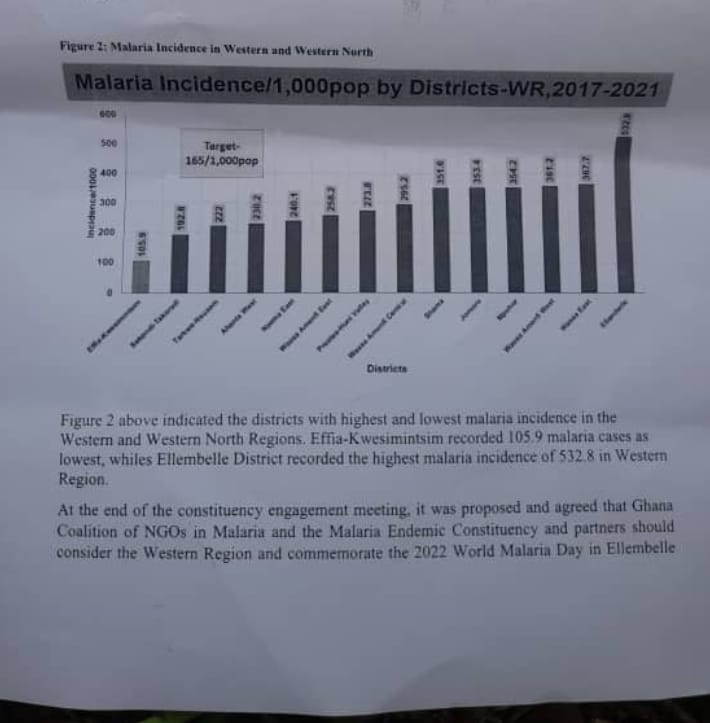The Ghana Coalition of Non-Governmental Organizations in Malaria (GCNM) has identify the Ellembele District as a malaria endemic area in the Western and Western North regions following a survey conducted.
According to them, the contributing factor is the massive breeds of mosquitoes in the District as a result of stagnant water in many uncovered pits of mines in the area.
Meanwhile, Western Region was the lead region of malaria-endemic in 2019 with the highest prevalence rate of 27 per cent whiles Greater Accra Region became the lowest region with the prevalence rate of two per cent.
The report was captured in the Ghana Malaria Survey implemented by the Ghana Statistical Service (GSS) in collaboration with the National Malaria Control Programme (NMCP) and the National Public Health Reference Laboratory (NPHRL) of the Ghana Health Service (GHS).
Speaking at the media engagement in Takoradi ahead of the commemoration of the 2022 World Malaria Day (WMD), the President of GCNM, Jonathan Tetteh-Kwao, said Ellembele District is the area with the highest record of malaria cases in the Western and Western North Region with 532.8.

Moreover, the Effia-Kwesimintsim Municipality comes as the municipal with the lowest cases recorded in the region with 105.9.
However, to achieve the Global Malaria Strategy’s goal of 90% reduction in malaria incidence and mortality by 2030 Worldwide, the research, highlighted that vulnerable populations who do not have access to quality malaria service must be given the necessary attention.
“In communities where malaria is more endemic, we see challenges such as limited access to quality and affordable drugs, lack of bednets for some populations, limited resources of civil society organisations to reach the most vulnerable population and limited diagnosis of cases. Also, there is a growing problem of antimalarial and vector resistance which needs to be addressed” Mr. Kwao noted.
Therefore, he said, individuals, organisations and the government must all come on board in the role of eliminating malaria to help achieve the ‘Zero Malaria’ agenda.
To advance the fight against malaria, he indicated that the intervention must be centered on communities with the needed call and attention, with actions to help deal with the growing situation.
He also disclosed that Ghana had in collaboration with Kenya and Malawi piloted a new vaccine to aid in the fight against malaria in the country.
The President took the opportunity and entreated all health professionals in the Western and Western North regions to ensure that all patients suspected to have malaria are first tested using RDI or microscopy.
He was thus emphatic that “only those that are tested positive are treated with an appropriate and effective antimalarial medicine in line with guideline protocols.”
Meanwhile, a proposal was agreed that Ghana Coalition of NGO’s in Malaria and the Malaria Endemic Constituency would consider the Western Region and commemorate this year’s event in the Ellembele District.









































































